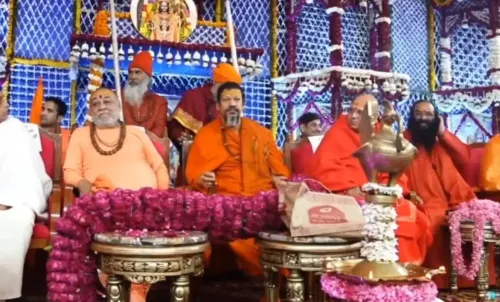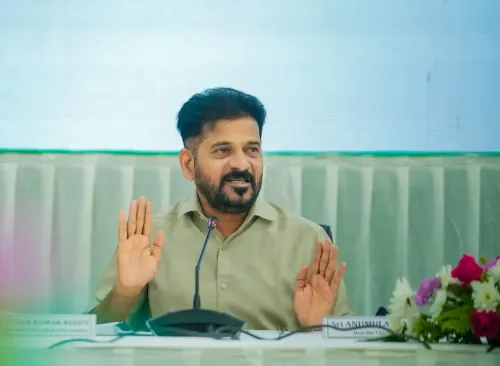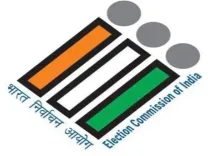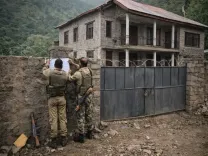Is Pakistan's Hostility Towards Bharat Leading to Its Own Downfall?
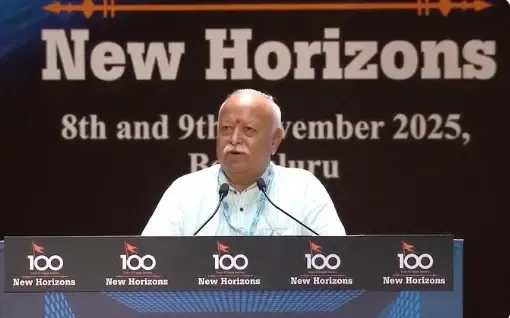
Synopsis
Key Takeaways
- Pakistan's actions harm itself.
- Peace requires strength and unity.
- Decentralized economy can reduce inequality.
- Border security is essential.
- Historical resilience is key to India's identity.
Bengaluru, Nov 9 (NationPress) In response to a question about India pursuing peace with Pakistan during an event in Bengaluru, Rashtriya Swayamsevak Sangh (RSS) Chief Mohan Bhagwat stated that it is Pakistan that is unwilling to foster peace and continues to derive satisfaction from inflicting harm on India. He emphasized that this pattern will persist.
The RSS Chief asserted, "We have consistently aimed for peace with Pakistan. It is Pakistan that disrupts this peace. As long as Pakistan finds gratification in harming Bharat, it will persist in its actions."
He continued, "The road to peace with Pakistan is straightforward -- we will not break the peace from our end. However, should Pakistan attempt to disturb this peace, it will ultimately fail. The more it attempts, the greater the harm it will face," Bhagwat expressed.
Reflecting on the 1971 war with Pakistan, he recalled, "Pakistan launched an invasion in 1971 and suffered the loss of an entire army of 90,000 soldiers to Bharat. If such incidents keep occurring, Pakistan will come to realize that cooperation is more beneficial than conflict."
"I believe Pakistan does not understand any other approach. Therefore, we must communicate in a manner it comprehends -- the language of strength. Once Pakistan recognizes its inability to harm Bharat, it may grasp that being a genuine friend and cooperating is the better path. This is the key message they need to understand," RSS Chief Bhagwat added.
He further noted, "We must remain vigilant against their (Pakistan's) repeated attempts. It is essential to provide them with a robust response each time, ensuring they incur losses they will reflect upon. As this continues, one day Pakistan will comprehend. We hope they realize this soon and embrace peace. With our advancement, we also aim to assist them in progressing -- this reflects our peaceful intentions," he stated.
When addressing a question concerning wealth concentration among a select few individuals, RSS Chief Bhagwat acknowledged that such inequality is prevalent across all nations.
"We need to demonstrate a different path to the world. Our vision is not mass production, but production by the masses. Decentralized production leads to the distribution of wealth. We must succeed in establishing a decentralized economic model and present it as a global example," he added.
On the topic of porous borders and illegal immigration from Bangladesh, RSS Chief Bhagwat remarked, "We must secure our porous borders. In Manipur, some individuals oppose closing the borders due to their unnatural nature -- as we were once a single nation. However, that cannot serve as an excuse. Our borders must be adequately protected," he stressed.
He also stated, "Corruption and organized crime exist because members of our own society are involved. The unity and moral integrity of our populace are fundamental issues. We have considerable work ahead to strengthen these aspects."
"In a century, three continents were transformed. In Bharat, even after three centuries, the converted population remains a minority. From Mexico to Siberia, entire nations were altered or eradicated through violence. In India, even after 500 years of rule by such forces, we remain Hindustan," he noted.
"We can preserve this strength even now -- we must remember our unity and collective identity," he emphasized.
The RSS Chief also stated, "Leaders should strive to ensure that people share the same temples, the same water sources, and the same burial grounds. Love and respect have long been the deepest needs of the marginalized. If provided with this, they possess the potential to uplift themselves. Let us exercise patience and allow reservations to persist," he concluded.




